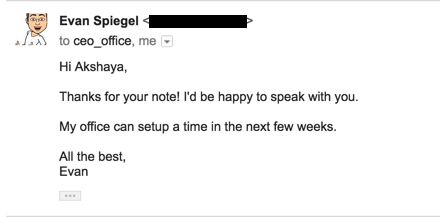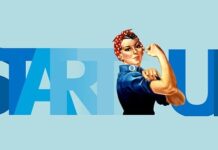A few months ago, my friend Elizabeth and I had the amazing opportunity to interview the Founder and CEO of Snap, Evan Spiegel. As aspiring tech entrepreneurs ourselves, we wanted to hear his perspective on what young people can do to create successful companies. His answers were honest, insightful, and even surprising.

For those of you who aren’t familiar with him, Evan Spiegel founded Snapchat (Snap, Inc.) while he was a student at Stanford studying Product Design. He is currently the youngest billionaire in the world. During the interview, he spoke a lot about what he thinks led to his success, as well as advice he has for young entrepreneurs. I decided to write up a transcript of what we talked about into my first blog post so other people can hear about his journey and the advice he has!
1. How did you get interested in entrepreneurship and tech startups?
You know, I got really lucky in college because, in my sophomore year at Stanford, I was allowed to sit in on a class in the Business School called “Entrepreneurship and Venture Capital.” As part of this class, some of the best entrepreneurs and CEOs ever, come in and talked to the class. Because I was auditing the class, for some reason, my visitor chair was right next to the visiting speaker chair. So I got to sit next to all these amazing people when they came in to speak to the class. One day, this guy, Scott Cook, the CEO of Intuit, came into the class, and we sorta got along and spoke after class, and I just begged him for a job at Intuit. And he said, “okay, okay,” and he gave me a job on a really small team, like 3 people. We were making text-based applications for users in India. There were only 3 of us, and we were able to do a ton. I’m sitting there, and I’m like, I’m on a 3 person team, and we’re able to build a bunch of stuff and ship it in 6–9 months, so… why am I doing this at a big company?
At that point, I started working with my friend Bobby, who lived across the hall from me, on a couple different projects, and we started there.
2. Did being at Stanford or in Silicon Valley help kickstart your journey?
The one unique thing, is that when it comes to fueling technology startups, Silicon Valley, and Stanford in particular, has a very different mindset than the rest of the world, because the financial model is so different. In Silicon Valley, all the investors here that you meet, they are trying to get a 1000X return on one investment with the understanding that every other investment is gonna go to 0. So everyone is trying big ideas and big concepts, and everyone is willing to invest a lot of money and lose a lot of money for a long time before something really gets traction. In that sense, I think Stanford / the Valley are different because the economic models are different. When I go and visit schools in different parts of the country, a lot of people there are focused on getting to profitability really quickly, and the scale of the business doesn’t matter as much. In Silicon Valley, people are focused on: are you building a business that could be HUGE?
3. When you started working on the initial idea for Snapchat, were you expecting it to become such a huge company?
To back up a little bit, before we made Snapchat, we made this thing called “Future Freshman,” which was designed to help kids get into college, and it totally failed.We worked on it for a year and half, and it just bombed. Both of our siblings, Bobby’s brother and my younger sister, were both applying to college, and neither of them used it. *chuckles* It was kind of a disaster. We spent SO much time, working like 24 hours a day, on this project and put so much effort into it and no one used it. That was a really informative experience for us because after that, rather than trying to build this really complicated, sophisticated piece of software, we decided we need to start with a simple concept, just build it and see if people like it, then go from there.
We tried a couple other little projects, and Snapchat, which was called Picaboo at the time, we had no idea if people were gonna use it. We thought the idea was compelling, because Bobby’s basic idea was if we can get people using their camera 10 times a day instead of once a week or once a month, we can build a big and unique business. Once people started to use our crummy prototype, we were able to build on that. The most important thing for a startup in particular is just putting one foot in front of the other, and not getting caught up in “I wanna raise a bunch of money first” or “I wanna put together a business presentation first” or “I wanna build a big team first.” But really, the first and most important step is serving the customer.
4. How did you meet your cofounders?
Bobby lived across the hall from me, and my bigger brother in my fraternity was Bobby’s best friend (he’s two years older than me). So, that’s how I got to know him, and we just started hanging out. I was doing a lot of graphic design. Stanford doesn’t have a very good art scene, or a very good art program, and so weirdly enough, the rare skill at Stanford is not computer science. There’s a lot of CS folks, but not very many people that know how to design stuff. In high school, I learned how to design stuff, so a lot of people were coming to me like: “hey, I need to make a website” or “hey, I need to design a T-shirt,” whatever it was. Bobby studied Mathematical and Computational Science, so it’s like Statistics and Comp Sci. Bobby was really, really smart, and I really admired him — we just had so much fun talking, and I think he appreciated that I could design stuff, so it was sort of a natural pairing. I could do the design, and he could do the engineering.
5. How did you get interested in design back in high school?
It’s funny because the first thing I was interested in in middle school was computers. I built my own computer, and then the next logical step was once I had my own computer, was to start playing around with Photoshop. I just really enjoyed it. I took a bunch of graphic design classes in high school, and I worked on our school newspaper. Just following my excitement with computers, I started becoming interested in design.
6. Do you still work on design for Snapchat?
The design part is my favorite part of the job. I get to do that like 2 or 3 days a week. And the rest, I gotta do some slightly more boring stuff.
7. What does your typical work day look like?
Really depends on the day. I get up really early, because that’s the only time that’s “Evan Time” for me, when people aren’t really awake yet. I get a couple hours between 5AM and 7AM to do whatever I wanna do, whether it’s get ahead on work or — I’m a helicopter pilot — so I usually fly in the morning to relax. Then, I usually have just a back-to-back day. A lot of it is meetings with leaders throughout our company, and 2–3 days a week I’m in our design studio for a couple hours, and that’s the fun part.
8. Did you want to be an entrepreneur in high school?
The thing I did in high school that led me to where we are today is that I was just very, very curious about pretty much everything. I would beg people to give me jobs, so in high school, I begged this guy who worked at Red Bull in marketing to let me work for him. Basically I said “I will do whatever you need me to do, just let me know. Please, please, please.” Finally, after a month or two, he was like “Fine. You can be like my intern.” A couple days a week after school, I would go work for him and do whatever he needed. Then, one summer, I got a job doing early-stage computational drug discovery, just from asking people “I’ll do whatever you need me to do.” It was pretty boring, I was just running computer programs all day to try to discover new drugs.
But for me, the most important ingredient was just being very, very curious and wanting to learn from people who were smarter than me. The number one thing that has helped me grow is just having access to smart people and their generosity in teaching me how to be a better leader.
9. What is your opinion on networking?
I think networking isn’t particularly useful, like just “meeting people” isn’t very useful. I would do one of two things. If I found someone I really admired, I would basically just offer to work for them for free, and do whatever they wanted so I could learn from them. And also later on, now what I do, is I know a few really brilliant people and I reach out to them when I have a problem or a question. By being more targeted, I’m being more respectful of smart people’s time, because time is so precious. A lot of really smart people, when you just reach out, and you’re like “I’d love to meet, or talk to you” it doesn’t really work. I get a ton of emails from people that are like “hey, I’d really love to meet you or talk about my idea,” and it’s really hard for me to be useful with someone else’s idea. But if someone wants to learn about entrepreneurship, hopefully I can be useful.
10. Do you have any advice for young people like us who want to become entrepreneurs?
The number one thing at this stage is to just get exposure to the business world and people doing stuff. Do that by making yourself as useful as possible to people. Literally, I would just be like “how can I best serve you?” I think it’s especially hard in high school because there’s a lot of laws regulating young people working, which is really annoying, because you have to be like 18 to intern, it’s like “what the f*ck? I can help you.” It’s super, super annoying for us too, because I wanna create opportunities for young people like the ones that were helpful to me when I was younger, but there’s so many legal issues around anyone who’s younger than 18. So I think if you can work really hard to find an opportunity where someone will just let you learn, and you can be in the workplace, that would go a really, really long way. You would just be so far ahead of your peers, who will probably start looking for a job like sophomore, junior year of college. You’ll be 4 or 5 years ahead of these folks if you’re already in the business world and learning how that works.
To summarize, things Evan found useful to his career were: begging smart people for jobs, being at Stanford/Silicon Valley, starting with a simple concept, serving the customer, being curious, and starting early.
I will probably post one more interview transcript like this on my blog, along with some more original content around entrepreneurship and technology, so follow or give me some claps if you enjoyed reading this!
source: medium.com












